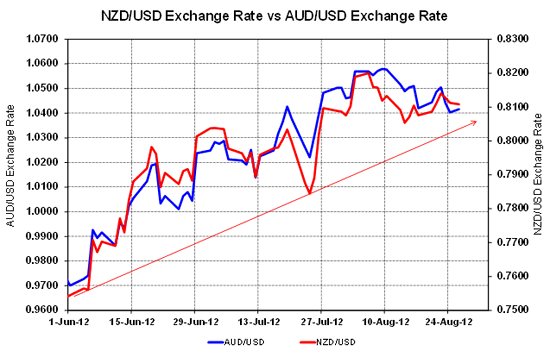
 By Roger J Kerr
By Roger J Kerr
Expect the Australian dollar to come under further selling pressure this week as the FX markets respond to weaker Chinese economic data and thus no prospect for improvement in metal and mining commodity prices anytime soon.
Either you believe the Australian Government Resources Minister, Martin Ferguson that the mining boom is over, or you believe RBA Governor Glenn Stevens who stated their position in a speech last Friday that the mining boom will peak in two years time and then come off.
You only have to look at the BHP Billiton and Rio Tinto share prices to conclude that the Resources Minister might be more on the money than an out-of-touch RBA.
The de-coupling of the AUD/USD exchange rate value from metal and mining commodity prices over the last two months is disastrous for the Australian economy.
Some investment banks are now forecasting the Australian economy to fall into recession in 2013 because of the consequences.
The super confidence in investment, financial and commodity markets only a few short months ago that the investment pipeline in mining/energy projects in Australia was locked in has now changed to pessimism for the sector and thus pessimism for the Australian economy.
One still has to conclude that the AUD is on borrowed time, however perhaps the real selling will not commence until the RBA concede they are wrong and their rhetoric changes.
The Gillard Government is worried as their tax revenues from the resources sector decline from expectations.
A lot of pressure is coming on the RBA, however at this juncture they are still waiting to see the response from the economy on earlier interest rate cuts. In the meantime, the one go forward part of the two two-speed Aussie economy is faltering and it cannot be too long before the currency markets react to this changed situation.
------------------------------------------------------------------------------------------------------------------------------
To subscribe to our daily Currency Rate Sheet email, enter your email address here.
------------------------------------------------------------------------------------------------------------------------------
The AUD rate against the USD has already broken below its up-sloping support line since the lows of 0.9700 in June, whereas the Kiwi dollar has to move below 0.8050 to breach its up-sloping support line since the lows of 0.7500 in June (refer chart below).
Given the short-term global economic outlook, the AUD appears particularly vulnerable to a four of five sent sell-off from current levels of $1.0400. The stars would have to align for this to occur with the ECB disappointing the markets and the Euro weakening back to $1.2000 from $1.2500 against the USD, as well as the markets re-rating the QE3 monetary easing probability as lower following Ben Bernanke’s speech at the Jackson Hole central banker’s jamboree this coming weekend.
Stronger US economic data in the meantime would assist the view that the Federal Reserve will not print more USD’s with QE3.
Forecasts for US GDP growth data for the June quarter this Thursday is an annual rate of 1.7% following the 1.5% growth in the March quarter. A stronger number above 1.7% would be positive for the USD and negative for the antipodean currencies.
Perhaps RBA Governor Glenn Stevens will change his view on the Aussie mining sector after hearing firsthand the challenges the global economy faces at Jackson Hole.

* Roger J Kerr runs Asia Pacific Risk Management. He specialises in fixed interest securities and is a commentator on economics and markets. More commentary and useful information on fixed interest investing can be found at rogeradvice.com
No chart with that title exists.
7 Comments
It's a version of an old story - "Don't fight the Fed" - many got rich doing as they do but not necessarily as they say.
Roger J Kerr
Ferguson and Stevens are talking about two different things.
Ferguson is talking about Commodity prices for iron ore and coal and he is correct.
Stevens is talking about the mining investment pipeline of $400 billion commitments over the next two years, and he is also correct.
Both streams of expenditure/revenue show up in the GDP figures. They're both right.
This is a must read
http://www.mauldineconomics.com/images/uploads/pdf/mwo082712.pdf
> Australia net external debt levels resemble those seen in the European periphery; the currency is fundamentally vulnerable. Australia has been running a persistent current account deficit since 1980 and the country's negative net international investment position is one of the largest in the world. On this background, the strong currency makes no sense and fundamentally the currency is very vulnerable to capital flight from the banking system.
> Australian banks and corporates rely heavily on foreign funding; the RBA will have to provide liquidity through LTROs. Structural global deleveraging and stop-go flows add volatility for Australian banks. As the housing market continues to correct, it may be difficult for Australian banks to fund themselves. Lowering interest rates will hurt the margins of the banks, and the RBA will likely be forced into domestic liquidity operations to prop up its banks.
Yet, a closer look and you will find Australia and its neighbour New Zealand in the same company, with negative NIIPs well above countries such as Turkey and Brazil.
All that is printed in this doc is true - but the AUD is a free floating sovereign unit of currency exchange, a luxury not applicable to the peripheral European nations.
The noteworthy country of exchange rate comparison - the United States - is in decidedly worse shape overall. These matters are, after all, relative when floating exchange rate nations are the currency of comparison.
Very interesting, thank you.
I note the paper's question as to whether an inevitable and necessary drop in the AUD will be forced on Australia by a balance of payments problem and a relatively sudden withdrawal of funds by foreigners; or whether the RBA will preempt that by pursuing a lower AUD earlier. NZ's position is clearly a close parallel. As the paper notes, in either case, the central banks can print money to solve any liquidity crisis domestically, so the problem may not be all that large.
I personally strongly favour the pre empting route, largely to help the competitiveness of our remaining industry; but also to start slowly to address our very negative net international investment position; in other words where we would stop selling what we have, and while probably wishful thinking, actually maybe even start to buy some of it back, or pay off some of the debt around its neck.
So why the hell are they continuing to lend to marginal dairy farm conversions.
Ill advised by their superiors - talent is hard to come by -as Mr Pytel noted :
Depleting reserves banking" practice, peddled by fraudsters, need an army of incompetent "professionals" to run it. Incompetent to such a degree that they did not understand that this was a crude pyramid scheme that was bound to collapse. Hence a huge bunch of history, anthropology, other social sciences and, importantly, lawyers were employed as banks executives to execute heist designed that way. Typically these people's career in banking was very often based on hang-ups. A huge majority of them were very poor in maths in school and banking environment gave them a sense of massive self-importance. They became "masters of the universe" whilst many of their friends who were so much better in science at school were left behind in pretty poorly paid and mundane engineering jobs.

We welcome your comments below. If you are not already registered, please register to comment
Remember we welcome robust, respectful and insightful debate. We don't welcome abusive or defamatory comments and will de-register those repeatedly making such comments. Our current comment policy is here.